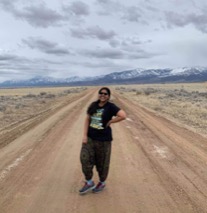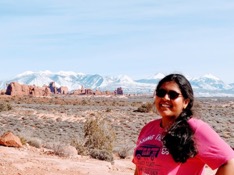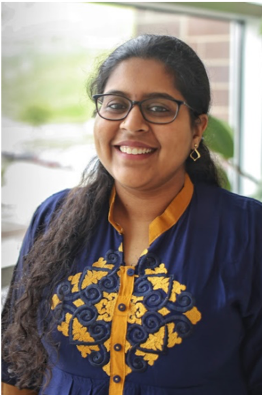Meet Supraja Ranganathan!
Bass Lab (Biochemistry)
Tell me a little about yourself. Where are you from, what degree(s) do you have? What are your interests?
I am Supraja, a second-year graduate student. I grew up in Chennai, a South-Indian city off the coast of Bay of Bengal. I graduated from SASTRA University, India, with an undergraduate degree in Biotechnology. Having worked in various research labs as an undergrad, I discovered that I loved and was most passionate about research in basic science. I am currently interested in dsRNA, RNA binding proteins, viral innate immune pathways.
Why did you choose the U for graduate school?
The bioscience program at the U has a great umbrella program where graduate students have the opportunity to choose from over 180 labs from diverse areas of research. The research labs have a collaborative, supportive and professional environment. The U also has a diverse international community. With respect to funding, the university graduate school offers fellowships for international students as well.
Tell me about your lab. What do you study?
At the Bass lab, we study dsRNA binding proteins. We mainly focus on two dsRNA binding proteins, Dicer and ADAR. My work focuses on ADAR and viral innate immune pathways.
Why did you choose to join your lab?
First and foremost, my research interests overlapped with the research at Bass lab. The Bass lab has a very collaborative environment. Brenda’s mentorship is hands-off and she encourages her students to direct the projects based on student’s interests.

What do you like the most about living in Salt Lake City?
Where do I start? I just love everything about what this city has to offer. SLC is surrounded by mountains and that is just enough to brighten my mood. You can find all levels of hiking trails around SLC. From Mexican to Italian to Greek to Indian, you can fill in your taste buds with a new cuisine every other week and also has great vegetarian/vegan options. Public transportation is amazing and you can pretty much travel around the city using the buses or trax lines.
What do you like the least?
I grew up by the coastal areas and hence I am accustomed to the humid, hot weather. SLC is super dry and is probably the one thing I like the least about this city.
What do you like most about being a graduate student?
Flexible working hours and lots of pizza. Apart from that, as a graduate student, you definitely have a lot more opportunities to learn and grow as a researcher. I am grateful to have a great mentor and supportive lab environment to achieve the goals of my extremely challenging and interesting projects.
What types of things do you do outside of class and lab?
I usually practice music at home and hike on weekends. I have a group of friends here and we all love to try new restaurants and review. (We have an IG food blog, the_phoodie_lab, do follow to know the best restaurants in town!)
What does a typical weekday look like for you?
My day starts with me spending some valuable time my worms. Following which I usually have some biochemical and molecular biology experiments lined up. I also attend a few seminars every week to keep myself updated with interesting science and
What does a typical weekend look like for you?
I spend most of my weekends with my friends. You will find me hiking new trails or trying out new restaurants to review on. I also do most of grocery shopping and cooking over the weekend so that I can focus on lab work and other activities during the weekdays. Rarely, I do come into lab if my worms need me.

What advice would you give to someone applying and interviewing for graduate school?
No one knows you better than yourself. So, be wise in choosing a school for your graduate study. It is really important to make yourself happy and have the motivation to wake up every day to do research. It is really important to realize what is best for you.
With respect to interviews, professors here look for a person who would be the best fit in the program. It is not really question if you are worth it. So, discuss your previous research experiences and what you look for in a grad school very clearly during interviews. It is also good to ask questions about work ethics in general, since it is very important to know how well they match with the people you would be working with.

